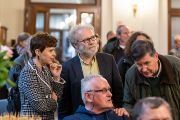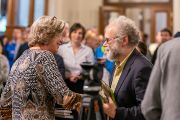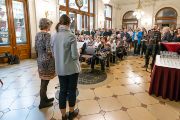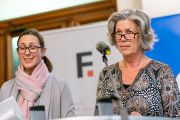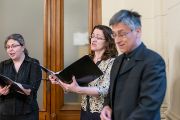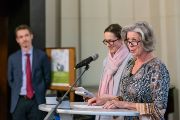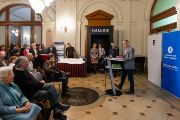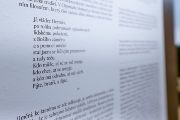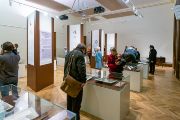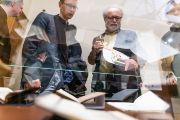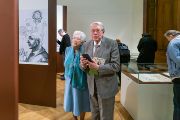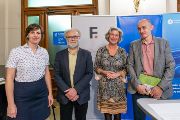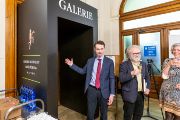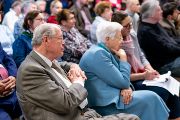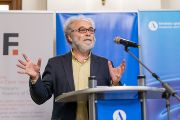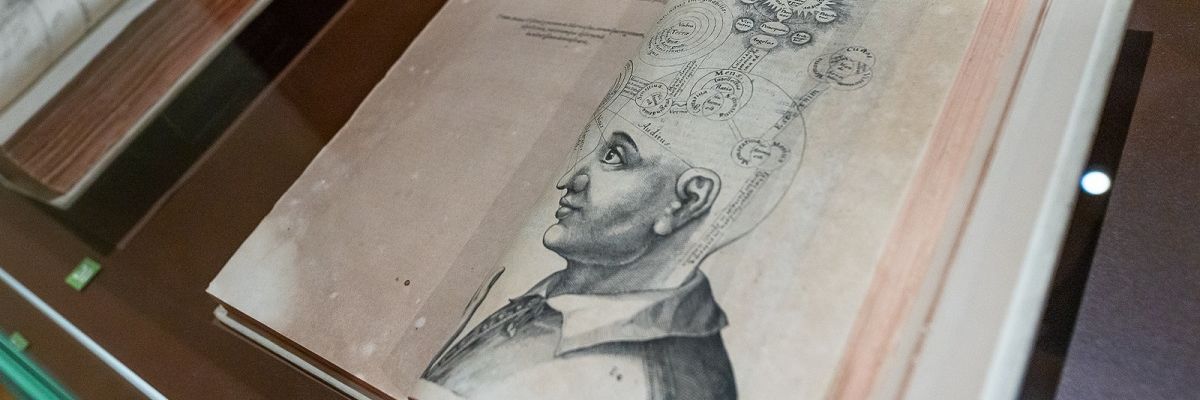
Rare illustrations presented at the exhibition Divine Wisdom – Divine Nature
16. 05. 2019
Originals of scientific illustrations of books from the 17th century, borrowed from various institutions including the Ritman Library in Amsterdam known as Bibliotheca Philosophica Hermetica, are presented at the latest exhibition in the Gallery of Science and Art at the headquarters of the Czech Academy of Sciences. The opening for public, attended by the CAS Vice-Chair Pavel Baran, took place on Tuesday, May 13.
The exhibition Divine Wisdom – Divine Nature: The Rosicrucian Manifestoes, Europe and the Czech Lands in the 17th Century in the Gallery of Science and Art at the main building of the Czech Academy of Sciences (Národní 3, Prague), commemorates the recent 400th anniversary of publication of the Rosicrucian Manifestoes, presenting a part of the literary production of their age which reacted to the crisis of knowledge, religion, and politics.
Included are repercussions of these writings in the Czech Lands at the end of the reign of the Emperor Rudolph II and in the years of political, religious, and cultural changes after the Battle of White Mountain in 1621. The visitors will see precious, lavishly illustrated prints and manuscripts that show the contemporary intellectual movements, as well as book culture and visual culture including visual communication.
These are mainly works that concentrate on Hermetic and Rosicrucian philosophy of the 17th century whose ideas were connected with Neoplatonic philosophy of the Renaissance. Along with efforts for the betterment of the individual and the society, typical for the time of John Amos Comenius, they became a part of European cultural heritage. The exhibition also presents virtually unknown works by Comenius’ contemporaries, people who were exiled after the Battle of White Mountain, especially Paul Felgenhauer (1593–1677) and Ondřej Habervešl of Habernfeld (1587–1655).
The exhibition was created in cooperation with The Embassy of the Free Mind in Amsterdam, which encompasses the library Bibliotheca Philosophica Hermetica, an associated museum, and the Ritman Research Institute. Esther Ritman, director of Bibliotheca Philosophia Hermetica who has opened the exhibition together with the CAS Vice-Chair Pavel Baran and Vladimír Urbánek from the Institute of Philosophy of the CAS, stated that since 2014, the exposition has travelled around a number of European cities such as Basel, Amsterdam, Krakow, or Budapest. This year, the exhibition has been finally brought to the Czech capital, leaning on organisational support from the Centre for Administration and Operations of the CAS.
A glimpse into the book culture of the 17th century
The core of the exhibition consists of rare old prints from the Embassy of the Free Mind/Bibliotheca Philosophica Hermetica Collection in Amsterdam, including texts by Robert Fludd, Heinrich Khunrath, Daniel Mögling, Johann Valentin Andreae, Michael Maier, Oswald Croll, and other authors. The most important exhibits are the Rosicrucian Manifestoes, especially Fama Fraternitatis and Confessio Fraternitatis.
Many of the prints contain engravings that not only showcase the high quality of the contemporary book culture but also illustrate philosophical and religious ideas arising from Hermetic and Rosicrucian intellectual movements.
“The exhibits are supplemented by old prints from Prague’s libraries – the National Library of the Czech Republic, National Museum Library, and Strahov Library, that have provided especially specimens of works by Comenius and his co-workers in exile, as well as other authors,” emphasises Esther Ritman. At the opening of the exhibition, she has also presented the Czech translation of the book Divine Wisdom – Divine Nature, published on the occasion of the exhibition and with support of Rosecrucian Endowment Fund (Rosekruciánský nadační fond).
The exhibition draws on the work of the Department of Comenius Studies and Early Modern Intellectual History of the Institute of Philosophy of the CAS – especially on the research into intellectual undercurrents that formed the mind of J. A. Comenius. The Institute of Philosophy has previously collaborated with Bibliotheca Philosophica Hermetica several times, for example on the occasion of Comenius’ anniversary in 1992 or a Comeniological conference in Naarden in 2013.
Prepared by: Luděk Svoboda, Division of External Relations of the Centre for Administration and Operations of the CAS, with Milan Pohl, Department of Media Communication of the Head Office of the CAS
Photo: Jana Plavec, Division of External Relations of the Centre for Administration and Operations of the CAS
Video: Department of Audiovisual Technology of the CAS
Read also
- Public Hearing: “Making Sense of Open Science”
- SUNER-C concludes after three years dedicated to the renewable energy future
- A trapped state: The pandemic impact on public attitudes, trust, and behavior
- Aerial archaeology: Tracing the footsteps of our ancestors from the sky
- Archaeologists uncover ancient finds along Prague Ring Road
- Our microbiome largely depends on what we eat, says microbiologist Michal Kraus
- The ABCs of writing: Why did its invention mark a turning point for humankind?
- We learn, remember, forget… What can memory actually do? And can we outsmart it?
- New Center for Electron Microscopy in Brno opens its doors to global science
- The hidden lives of waste: What can we learn from waste workers and pickers?
The Czech Academy of Sciences (the CAS)
The mission of the CAS
The primary mission of the CAS is to conduct research in a broad spectrum of natural, technical and social sciences as well as humanities. This research aims to advance progress of scientific knowledge at the international level, considering, however, the specific needs of the Czech society and the national culture.
President of the CAS
Prof. Eva Zažímalová has started her second term of office in May 2021. She is a respected scientist, and a Professor of Plant Anatomy and Physiology.
She is also a part of GCSA of the EU.
